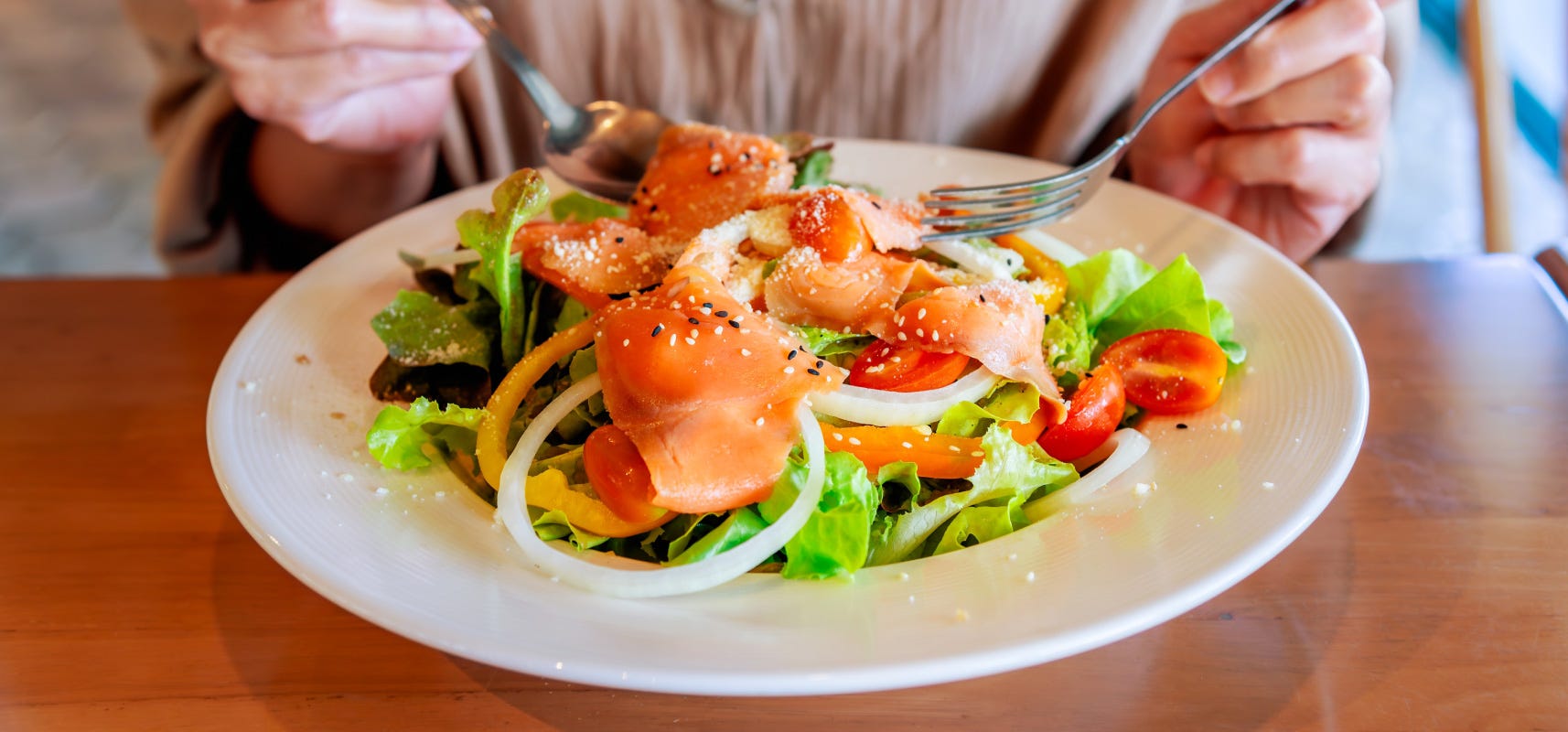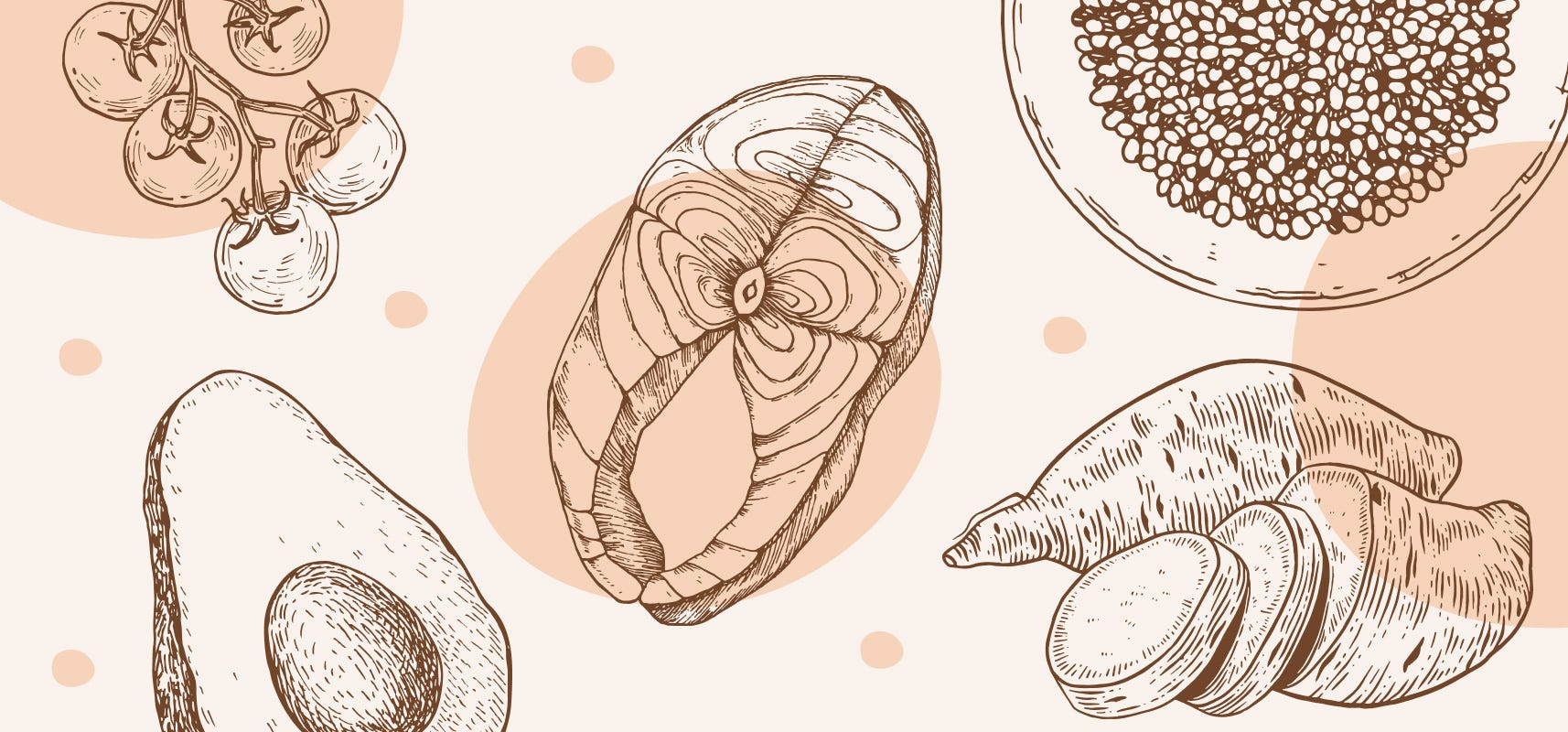Congratulations on your new bundle of joy, mama! As you navigate the postpartum period, also known as the "fourth trimester," it's essential to nourish your body with nutrient-dense foods that support recovery, healing, and milk production.
We understand that this time can be overwhelming, with countless articles and social media posts offering conflicting advice on what to eat and what to avoid. Rest assured, our goal is to provide you with simple, delicious recipes and evidence-based nutrition tips to help you feel your best during this special time.
Postpartum Nutrition Essentials


During the postpartum period, your body requires specific nutrients to support tissue repair, hormone regulation, and breast milk production.
Here are a few nutrients you should add to your postpartum diet:
Protein: Adequate protein intake is necessary for rebuilding tissues, particularly in the abdominal and pelvic areas, as well as supporting milk production. Aim to include protein-rich foods like lean meats, fish, eggs, legumes, and dairy products in each meal and snack.
Iron: Pregnancy and childbirth can deplete iron stores, leading to anemia and fatigue. Incorporate iron-rich foods such as red meat, poultry, fish, leafy greens, and fortified grains to help replenish your body's iron levels. If you follow a plant-based diet, pair iron-rich foods with vitamin C sources to enhance absorption.
Calcium: Breastfeeding mothers should consume adequate amounts of calcium to support their own bone health, as the amount of calcium a breastfeeding mom needs is the same as non-pregnant and non-breastfeeding mamas! Ensure you're consuming enough calcium-rich foods like dairy products, leafy greens, and fortified plant-based milks. If you suspect you're not meeting your daily calcium needs, consult with your healthcare provider about supplementation.
Vitamin C: This essential nutrient plays a vital role in wound healing, collagen production, and immune function. Incorporate plenty of citrus fruits, berries, tomatoes, and bell peppers into your diet to support your body's recovery process.
Omega-3 Fatty Acids: These healthy fats, particularly DHA, are crucial for infant brain development and may help reduce the risk of postpartum depression. Aim to consume fatty fish like salmon, sardines, and anchovies at least twice a week, or consider a high-quality omega-3 supplement if you don't regularly eat fish.
Other Food Options for Breastfeeding Moms


In addition to supporting postpartum recovery, certain foods may help boost milk production.
While individual results may vary, the following foods are often recommended for breastfeeding mothers:
Oats: Rich in iron and fiber, oats have long been considered a galactagogue, or a substance that promotes lactation. Enjoy a warm bowl of oatmeal for breakfast, or incorporate oats into cookies and smoothies.
Fennel: This aromatic vegetable contains estrogen-like compounds that may stimulate milk production. Add sliced fennel to salads, roast it as a side dish, or steep fennel seeds in hot water to create a soothing tea.
Fenugreek: Commonly used as a herbal supplement to enhance milk supply, fenugreek can also be incorporated into recipes. Sprinkle fenugreek seeds over roasted vegetables, or add them to curries and stews for a subtle maple-like flavor.
Garlic: Some studies suggest that garlic may improve the flavor of breast milk and encourage babies to feed more frequently. Use garlic to flavor a variety of dishes, such as pasta sauces, soups, and stir-fries.
Dark, Leafy Greens: Spinach, kale, and other leafy greens are packed with essential vitamins and minerals that support mom’s health. Incorporate leafy greens into salads, smoothies, and sautéed dishes for an easy nutrient boost.
Remember, every mother's experience is unique, and what works for one may not work for another! Trust your body's cues and consult with your healthcare provider or lactation consultant for personalized guidance.
Easy and Nourishing Postpartum Recipes


While you’re busy spending time with your newborn and adjusting to mom life, it can be challenging to come up with recipes that incorporate these different nutrients.
Don’t worry, mama—we've created a collection of simple, nutrient-dense recipes to help you prioritize self-care and nourishment during the postpartum period! These recipes are designed to be easy to prepare, with minimal ingredients and hands-on time, so you can spend more time bonding with your baby.
1. Overnight Oats with Berries and Nuts
Prep Time: 5 minutes
Serves: 1
Ingredients:
- 1/2 cup rolled oats
- 1/2 cup milk of choice (dairy, almond, oat, etc.)
- 1/4 cup plain Greek yogurt
- 1 tablespoon chia seeds
- 1 tablespoon honey or maple syrup
- 1/2 cup mixed berries (fresh or frozen)
- 2 tablespoons chopped nuts (almonds, walnuts, or pecans)
Instructions:
1. In a jar or container with a tight-fitting lid, combine the oats, milk, yogurt, chia seeds, and honey or maple syrup. Stir well to combine.
2. Add the mixed berries and chopped nuts on top of the oat mixture.
3. Cover the jar or container and refrigerate overnight, or for at least 6 hours.
4. When ready to eat, give the overnight oats a good stir and enjoy cold or at room temperature.
2. Spinach and Feta Frittata
Prep Time: 10 minutes
Cook Time: 20 minutes
Serves: 4
Ingredients:
- 8 large eggs
- 1/4 cup milk of choice
- 1/2 teaspoon salt
- 1/4 teaspoon black pepper
- 1 tablespoon olive oil
- 1 small onion, diced
- 2 cloves garlic, minced
- 4 cups fresh spinach
- 1/2 cup crumbled feta cheese
- 1/4 cup sun-dried tomatoes, chopped (optional)
Instructions:
1. Preheat the oven to 375°F (190°C).
2. In a large bowl, whisk together the eggs, milk, salt, and pepper. Set aside.
3. Heat the olive oil in a 10-inch, oven-safe skillet over medium heat. Add the onion and garlic, and sauté until softened, about 5 minutes.
4. Add the spinach to the skillet and cook until wilted, stirring occasionally, about 2-3 minutes.
5. Pour the egg mixture into the skillet, and sprinkle the feta cheese and sun-dried tomatoes (if using) on top.
6. Cook the frittata on the stovetop for 2-3 minutes, then transfer the skillet to the preheated oven.
7. Bake for 15-20 minutes, or until the frittata is set and lightly golden on top.
8. Remove from the oven and let cool for 5 minutes before slicing and serving.
3. Lentil and Vegetable Soup
Prep Time: 15 minutes
Cook Time: 45 minutes
Serves: 6
Ingredients:
- 1 tablespoon olive oil
- 1 large onion, diced
- 3 cloves garlic, minced
- 2 carrots, diced
- 2 celery stalks, diced
- 1 cup dried green or brown lentils, rinsed
- 1 can (14.5 oz) diced tomatoes
- 1 teaspoon dried thyme
- 1 teaspoon dried basil
- 1/2 teaspoon salt
- 1/4 teaspoon black pepper
- 6 cups low-sodium vegetable or chicken broth
- 2 cups chopped kale or spinach
Instructions:
1. Heat the olive oil in a large pot over medium heat. Add the onion and garlic, and sauté until fragrant, about 2 minutes.
2. Add the carrots and celery to the pot, and cook until the vegetables begin to soften, about 5 minutes.
3. Stir in the lentils, diced tomatoes, thyme, basil, salt, and pepper. Pour in the broth and bring the soup to a boil.
4. Reduce the heat to low and simmer the soup, partially covered, for 30-35 minutes or until the lentils are tender.
5. Add the chopped kale or spinach to the soup and cook for an additional 5 minutes, or until the greens are wilted.
6. Taste and adjust the seasoning as needed. Serve the soup hot, with crusty bread or crackers on the side.
4. Salmon and Sweet Potato Grain Bowl
Prep Time: 10 minutes
Cook Time: 20 minutes
Serves: 2
Ingredients:
- 2 small sweet potatoes, diced
- 1 tablespoon olive oil, divided
- Salt and pepper to taste
- 2 (4 oz) salmon fillets
- 1 teaspoon smoked paprika
- 1/2 teaspoon garlic powder
- 1 cup cooked quinoa or brown rice
- 1/2 avocado, sliced
- 1/2 cup cherry tomatoes, halved
- 1/4 cup crumbled feta cheese
- 2 tablespoons chopped fresh parsley
Instructions:
1. Preheat the oven to 425°F (220°C). Line a baking sheet with parchment paper.
2. Toss the diced sweet potatoes with 1/2 tablespoon olive oil, salt, and pepper. Spread the sweet potatoes on the prepared baking sheet and roast for 20-25 minutes, or until tender and lightly caramelized.
3. Meanwhile, season the salmon fillets with smoked paprika, garlic powder, salt, and pepper.
4. Heat the remaining 1/2 tablespoon olive oil in a non-stick skillet over medium heat. Add the seasoned salmon fillets and cook for 4-5 minutes per side, or until the fish is cooked through and easily flakes with a fork.
5. Assemble the grain bowls by dividing the cooked quinoa or brown rice between two bowls. Top each bowl with roasted sweet potatoes, cooked salmon, avocado slices, cherry tomatoes, crumbled feta cheese, and chopped parsley.
6. Serve the grain bowls immediately, drizzling with additional olive oil and lemon juice if desired.


5. No-Bake Lactation Energy Bites
Prep Time: 10 minutes
Chill Time: 30 minutes
Serves: 12 bites
Ingredients:
- 1 cup rolled oats
- 1/2 cup creamy almond or peanut butter
- 1/4 cup honey or maple syrup
- 1/4 cup ground flaxseed
- 2 tablespoons chia seeds
- 2 tablespoons brewers yeast (optional)
- 1/2 teaspoon vanilla extract
- 1/4 cup dark chocolate chips or chopped nuts (optional)
Instructions:
1. In a large bowl, mix together the rolled oats, almond or peanut butter, honey or maple syrup, ground flaxseed, chia seeds, brewers yeast (if using), and vanilla extract. Stir until well combined.
2. Fold in the chocolate chips or chopped nuts (if using).
3. Using your hands or a cookie scoop, roll the mixture into 12 equal-sized balls.
4. Place the energy bites on a parchment-lined plate or baking sheet and refrigerate for at least 30 minutes, or until firm.
5. Store the energy bites in an airtight container in the refrigerator for up to 1 week, or in the freezer for up to 3 months.
These are just a few of our favorite recipes you can try throughout the day, and modifications are always welcome! Remember, mama—it’s also important to listen to your body's hunger and thirst cues, and prioritize rest whenever possible.
Additionally, it’s helpful to keep nourishing snacks like fresh fruit, cut vegetables, and whole grain crackers readily available to help maintain your energy levels throughout the day, and lean on loved ones to help meal prep during the first few weeks postpartum. A little bit of community care will go a long way in speeding up your recovery process.
Foods to Limit or Avoid


While it's essential to focus on nutrient-dense foods during the postpartum period, there are certain substances and food groups that should be limited or avoided to support your recovery and your baby's health:
Alcohol and Caffeine: Both substances can pass through breast milk and may negatively impact your baby's sleep patterns and behavior. While moderate consumption (up to 1 standard drink per day for alcohol, and up to 300 mg of caffeine per day) is generally considered safe, it's best to consult with your healthcare provider for personalized guidance.
High-Mercury Fish: Certain types of fish, such as shark, swordfish, king mackerel, and tilefish, contain high levels of mercury that can be harmful to your baby's developing nervous system. Instead, opt for low-mercury fish options like salmon, sardines, and light canned tuna, and limit your intake to 8 to 12 ounces per week.
Highly Processed Foods: While convenient, processed foods like sugary snacks, soft drinks, and fast food often lack essential nutrients and can contribute to postpartum weight retention and risk of cardiometabolic disease. Prioritize whole, minimally processed foods whenever possible, and save treats for occasional indulgences.
Bon Appétit!
Nourishing your body with nutrient-dense foods is a vital aspect of self-care during the postpartum period. By incorporating a variety of nourishing ingredients and easy-to-prepare recipes into your diet, you can support your recovery, milk production, and overall well-being. Remember that every mother's journey—and diet—is unique. Be sure to consult with your healthcare provider or registered dietitian for personalized guidance.
As you navigate the joys and challenges of motherhood, know that you are not alone. Aeroflow Breastpumps is here to support you every step of the way, from providing tips on postpartum nutrition to sharing breastfeeding advice and helping you order a breast pump through insurance. We believe that by prioritizing your own nourishment and self-care, you'll be better equipped to care for your little one and enjoy this special time together.









